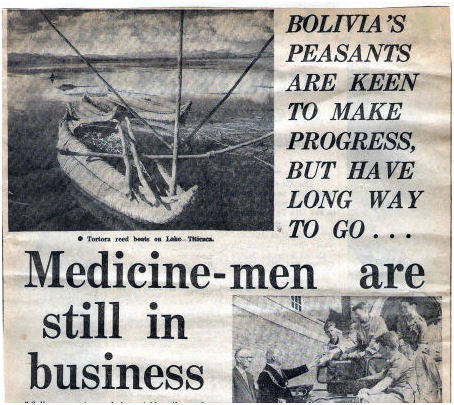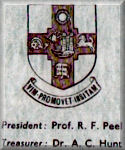University
of Bristol Trans-Continental Expedition 1960 — 61 | ||||||||
| ||||||||
| published 9 May 1961 | ||||||||
 Inscrutable Inscrutable
"Sullen, remote and inscrutable, the only interest he takes in the world is occasional aggression against strangers and an addition to alcohol at fiesta time." This opinion of the Indian is widely held by the educated city dwellers. "He refused to co-operate, always speaking his own language, and his senses are dulled by chewing coca." The Indian is probably all these things. As a generalisation there is much dangerous truth in it. There are also other things that the educated Bolivian may not know about his Indian compatriot, which would certainly confirm his bad opinion. For example: "Witch doctor" style medicine is still widely practised; a man with a fever may be wrapped in cheese which is subsequently removed and sold in the market (the consumer will inherit the fever); also infusions of grasses plus dried and powdered excrement of dog may be administered: open wounds are treated with spiders' webs, plasters of cow-dung or warm balls of coca chewed in the medicine man's mouth. Eager A backward people certainly. But the Indian, since the revolution of 1952, has come more into his own. Attempts are now being made for the first time to take education to the rural areas. It is very slow, but the movement has begun. And the Indian is eager for education for his children. "They shall not be blind as I am." The peasant communities will co-operate in the building of schools, providing land, labour, and the simpler materials, and sometimes paying the teacher if the Government is not doing so. There are two ways of looking at the Indian and his backwardness. The people in the cities who cannot feel interest in the humanitarian problems will doubtless continue to make the kind of remarks that opened this article. And to a certain extent they have justification; the Indian who now lives in the cities tends to be a debased stock, affected by the material sides of civilisation, without having had much benefit of its ennobling aspects. But these people were driven to the cities when their land was progressively taken from them during the first four or five generations of "free" Bolivia. Those who remained on the land were virtually slaves, having to labour free for the large land-owners to gain the privilege of cultivating their own small plots in their own time. Some of the land-owners looked after the health of their peasants in a rudimentary way, but in terms of good business rather than humanity; the Indians were cattle. No hope The Indian retired further into his hereditary shell. Government by the 'white man' had given him no cause for joy or hope. He was ignorant, of necessity, lived in squalid huts without ventilation or light, was unclean in his habits, and habitually chewed the leaves of the coca plant (from which cocaine is extracted) to combat fatigue, cold and lack of food. Indians make up about 85 per cent of the population of Bolivia. The vast majority of them live on the Altiplano, or high plateau, of the Andes and they are either peasants or miners. Here the average height is 12,000 feet and it can get very cold. So many layers of clothes are necessary. The women wear 10 to 12 skirts at a time - heavy wool, brightly coloured - and blouses and cardigans. One top of these are striped shawls, very gay (when clean). Over their shoulders they invariably throw another shawl draped to form a pouch at the back and in this they carry all kinds of articles from bread to babies. The sheer bulk of clothing is so great that they look like overdressed dolls. On their heads they wear bowler hats in brown, black or grey, the jaunty angle showing their pride in this improbable headgear. The men are much less exciting in appearance. Their clothes are derived from Western styles, though home-made (the women spin and weave the cloth - they are constantly spinning, even when walking down the street - and the men sew the garments). The only unusual touch is the wearing of many coloured woollen balaclava helmets with ear-pieces, with trilbies perched on top. Often the clothes are very old and have many patches giving certain picturesqueness which makes up for the lack of colour. Many of the Indians go barefoot, or wear sandals made from pieces of vehicle tyres (a new rural industry); shoes are very rare. Risky Their economy consists in agriculture and stock-raising. Because of the climate there is only one harvest a year and that is often ruined by frost. Fifty-sixty percent of the production is of potatoes, and there is also barley, beans, a little wheat and some vegetables. Because of climate risks the peasant often works three or four months as a trader, peon, herdsman, etc. or in some areas as a miner. After the revolution of 1952, land reform was inaugurated; the peasant was to become the master of the land he cultivated and the large haciendas were broken up. One large well-organised estate of 10,000 hecatarias (one hectare - 2 ½ acres) was divided at this time; the estate was allowed to keep only 600 hectarios and the rest was distributed among 4,000 farmers. Small plots of this type may no even be self-contained units. One farmer with six hectarios had it distributed in 54 tracts. Of 83,000 land titles distributed, it is estimated that land is split into perhaps one million tracts. This demonstrates the enormous difficulties in any land reform programme. The Government hopes to counteract this splintering effect by persuading the peasants to work in co-operatives. But, regrettably, the Government agents who were sent to instruct the peasants in these matters were often not farmers themselves and failed to win the confidence of the people. One mestizo (half-caste) a co-operative leader entrusted to buy in La Paz (the capital) the Government ration of food for the co-operatives, would subsequently sell some of it in the black market at advanced prices, return with the remainder of the food plus the money equivalent to the controlled price of the deficit, and pocket the difference between that and the black market value! [Editorial note - mestizo is a term no longer acceptable in Bolivia] Tricks like his show how gullible the ignorant peasant could be, and what an easy prey. They also made him suspicious of the very word "co-operative," although in some areas with better leadership and particularly under the influence of the United Nations Andean Missions, it has been shown that they are capable off organising and working co-operatively. The most hopeful sign in Bolivia is in the work of the United Nations Andean Missions - not because of the success they may be having, but mainly because of the method. Learning The Andean Missions bases are strongly against any form of paternalism. Things are not given to the Indian communities, instead they are taught the desirability of new ideas and how to organise themselves so as to achieve them. Skilled help is given free, and often loans, but they are learning that it is for their own benefit and they must accept the responsibility and the cost; loans are almost invariably repaid with in the stipulated period. We attended a meeting of a community together with the offers of one of the bases. The people wished to meet us and ask questions about England. We assembled in the new schoolhouse built by the community and opened only a couple of weeks before. It was 9 o'clock at night - the work in the fields preventing an earlier meeting - and the room was dimly lit by paraffin lamps. The people sat around the walls, all the men together (mostly wearing red ponchos for the night was very cold) and the women on the other side. This was a serious meeting and was conducted with great gravity. The questions were asked through two interpreters; anything we said was translated into Spanish by the doctor from the base and subsequently into Kechwa [ Quechua] by the agreement or the director of base schools (this base has organised 21 new schools in different communities). Q:
"How many people live on the land in England and do they have co-operatives?" We were asked what kind of crops and what kind of climate? Problem Then it was our turn to ask questions. We settled for a general one. They had just built a school, we said, what other plans had they for the improvement of their community? Did they wish for a health centre, more equipment …? A spokesman for the co-operative answered. "Yes, we had wished for a school, now we have it; a health centre, perhaps, would be nice in the future; we wish for work, and we have it; we sow our crops … but then the climate comes. For four years now we have had bad harvests. What we want is better harvests." "What steps will you take to improve them?" we asked. "What do you suggest?" they said. We said we had heard of strains of potatoes resistant to frost, which are used in cold countries like Canada. This caused tremendous interest. We would earn their undying gratitude if we could supply these; perhaps we could take away their potatoes and get them analysed in our own country and find out hat was wrong. We hastily backed out of that one and said that better kinds were available in their own country and in Peru, and that we hoped they could try them and have better results next year. Lazy The director of the base then harangued them. They were lazy he said; look at these young men who were still studying and trying to learn new things, but you will not learn new things for your own good. Then he went on more reasonably: "You have built this school, now you must build yourselves better houses, you must encourage your children to learn Spanish - how can they do anything speaking only Kechwa?[Quechua] " Also you have no tractor. Why does your Co-operative not try to buy a tractor? There was some discussion of this. Eventually it was agreed to hold a meeting of the co-operative very soon. They said we would be welcome if ever we walked under their skies again, and that if we could use our undoubted influence to get them an electric pump for irrigation they would be very grateful. We made no promises and the meeting broke up. | ||||||||
|

